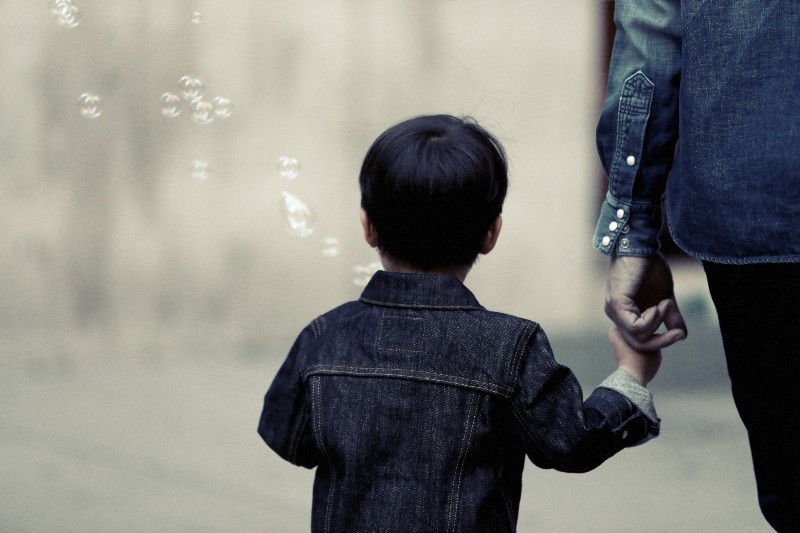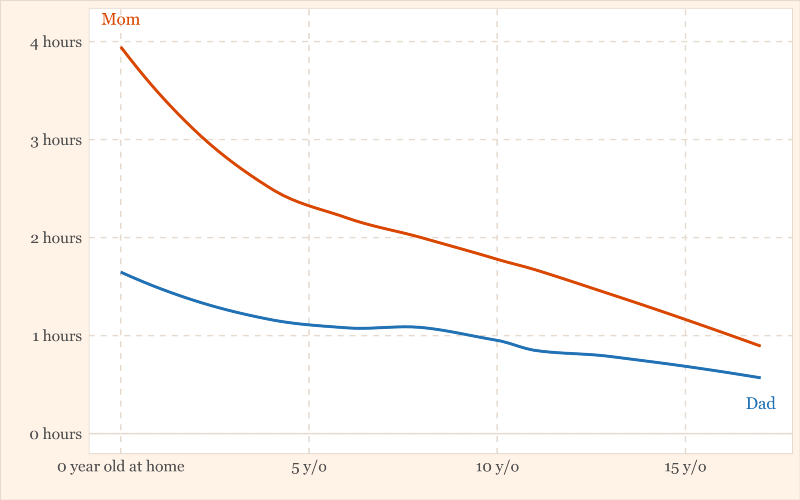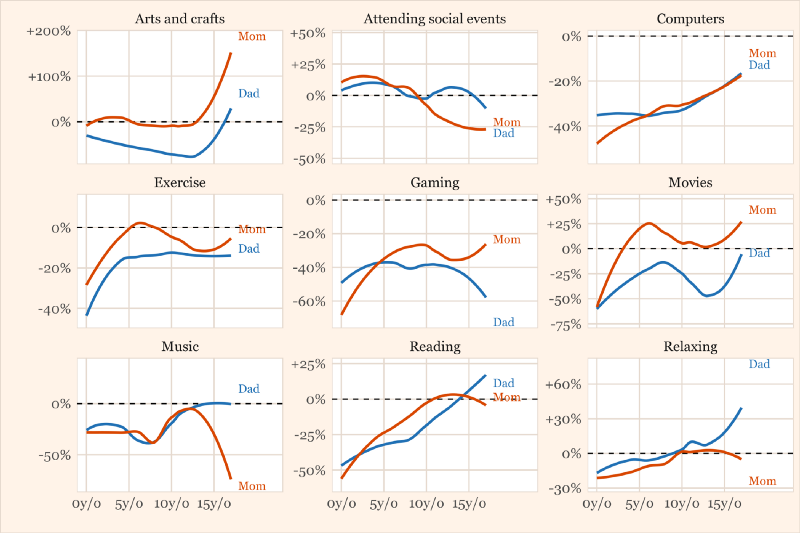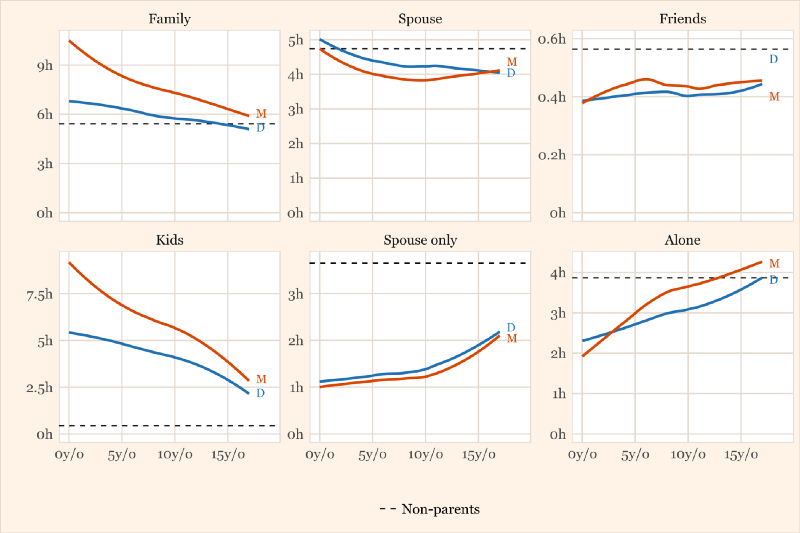by Henrik Lindberg
What to expect when you’re done expecting: visualizing the data of parenting

A new mother will spend about 40,000 hours with her child over the first 18 years. This averages out to six hours a day. Dad gets to spend about 30.000 hours. It’s certainly useful to enjoy kids if you’re thinking about becoming a parent. You’ll spend a lot of time with them. But you’ll also have plenty of time to get used to it, if you haven’t already.
Having kids changes your life. You suddenly became responsible for this seemingly helpless creature (that somehow still seems to make sure to be properly fed and held and kept clean…ish). The emotional swings between love and frustration and pride and guilt and punch-drunk tiredness. And the sudden shortage of spare time.
Having kids changes your life not only figuratively, but also in how you spend your days. Precisely how varies throughout the world. For example, Swedish parents get 480 paid parental days per child. It is not uncommon for mom to stay home for a year and dad for another six, eight, ten months. Or to set aside parental days to have long summer vacations.
Here, however, we will stay in the US. We’ll look at how life changes for American parents through the lens of the American Time Use Survey.
The changes you bring home together with the new life are immediate. They are without a doubt the greatest for the mother. Our survey gives data only by age in years of the youngest child living in the household, so to get an idea about the difference a child makes we have to look at the first year all at once.

A large, red field appears, spread throughout the day. The act of caring for a child takes almost four hours of mom’s time, plus two of dad’s, on average during the first year. (I would love to have seen data for the first few weeks; I suspect that our chart would be quite red.)
Caring for children is also not something that is easily scheduled —babies have a tendency of needing care throughout the day and at times not necessarily at parents’ convenience. To make room for all of this, mom’s work and mom’s leisure both have go give way.
Dad, on the other hand, typically stay at work and keep the other practical stuff going. Just as with mom, though, it’s no vacation: he equally cuts his time for leisure to care for the little one when he gets back home.

The first few months as a parent revolve around something other than yourself. From being used to do what you want, when you want to, nothing seems to be about you anymore. It can also feel quite alienating. You seem to live entirely different lives than your childless friends.

During the first year, mom spends four hours a day doing different things than her friends, and dad spends two. As the years go by, life gradually returns to what it used to be — or at least sets into a new balance where there is room for both being a parent, being a partner, and being a person.
By the time the youngest turns eight, that difference between mothers and non-mothers is down to two hours a day, and at age sixteen only one. Dad’s return to normality follows a similar pace, although consistently with only half the difference.
At 16 years of age, childcare requires only some fifteen minutes a day. Mom is still home a little more than her childless friends, and still does relatively more housework. Both mom and dad still spends less time watching TV.
There seems to be a popular myth about parenthood that you no longer have time for hobbies, or culture, or meeting friends. Our data, however, suggest that you don’t trade a glamorous life without kids for sitting isolated in the couch with.
Sure, many hobbies get put on hold when the kids are young, but the childless friends seem to spend their time watching TV or at the computer rather than going to parties or pursuing their artistic ambitions. So the truth is perhaps that few of us live glamorous lives regardless of children. Or, more likely, that if something is important to you, you’ll figure out a way.

It’s not only what we do that matters, it is equally important with whom we do it. Bringing up children can feel like a lonely endeavor, especially when you are cut down on work and other social activities.
The data confirms that parents spend more time with the family. Before the kids arrive, both men and women spend about six waking hours a day with their family. With a baby in the house, mom spends a full 10 hours with family, nine of which include the baby.

A common piece of advice given to new parents is to not forget about the partner. Raising kids is hard, but is easier and more joyful if you share it with someone you get along well with. Here, the good thing is that having a child doesn’t necessarily change the amount of time you spend with your spouse. You’ll still meet as much as you used to. The worse thing, though, is that the time you spend with your spouse alone changes dramatically, from four hours a day to one. It is probably for good reasons that we are told to set aside time together and to make the most of the time we are able to find.
The same is true with having time for ourselves. Me-time is immediately cut in half. The time we do take can be a source of guilt: it seems selfish to spend precious time doing things for oneself. Again, we are wise in taking the advice of those who have gone before us: You cannot give what you don’t have, so make sure to carve out time to get back in balance.
Becoming a parent is difficult from time to time. The life we’ve spent building becomes in many ways turned upside down overnight, and with little guidance we are able to relate to. In other ways becoming a parent is kind of easy. We have no choice but to adapt. The best we can hope for is to have a loving partner with whom to figure it all out. Beyond that, all we can do is to be prepared to not be prepared. Know that life suddenly will become different, before a new normal — not the same, but also not that different — will take its place.
All numbers here are taken from the American Time Use Survey 2003–2015, for people aged 25–50 years with spouses. All graphs were created by me.
